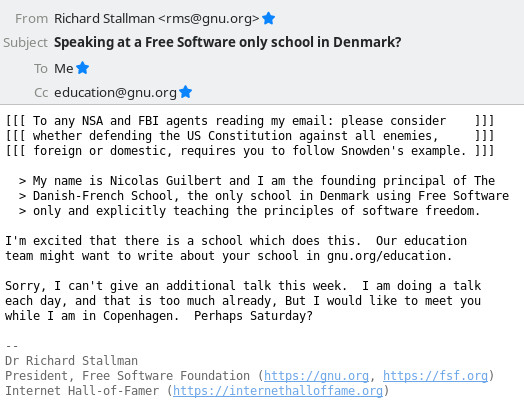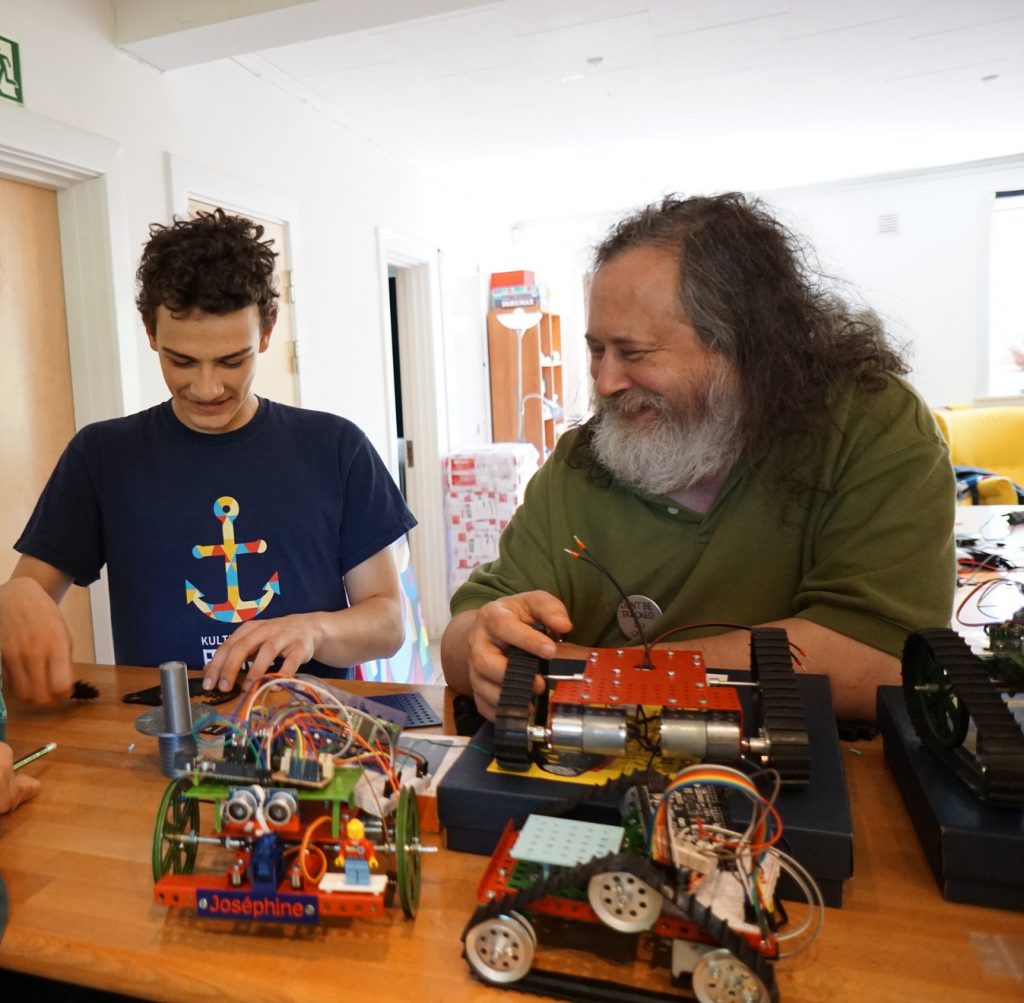As I got news of RMS visiting Denmark again, it struck me that he might be interested in visiting something as rare as a school clearly affirming that software should be free/libre. We are using the convention free/libre to emphasize that the software is free as in “freedom”, not “free beer”. It is an ambiguity of the English language that has historically caused some confusion, albeit the notions are not mutually exclusive. In fact, software freedom and financial viability have in retrospect turned out to be perfectly compatible.
I asked RMS an got the following answer:

An so it happened that RMS came to visit us last Saturday.
Aware of previous anecdotes about RMS’s supposedly lacking social skills, I was psychologically prepared to make use of the full special educational toolbox. That turned out to be unnecessary.
I first of all experienced RMS as someone who is listening and being razor sharp. He thrives best under a fast pace and needs a planned schedule. He prioritizes clearly and was for instance not interested in seeing the school’s gym. He has a well-developed sense of humor and speaks French and Spanish fluently.
His key issues are clearly defined and he works hard on them, squeezing work out of every minute. One might consider that it isn’t comme il faut to pull out your laptop and start working during the lunch, but objectively speaking it is the rational choice if you have a lot to do.
Different indeed, and thank god for that.

The impression I am left with is that RMS is as relevant as ever. Free software enabled a historical power shift in the (IT) world in the ’00s, illustrated in the ’10s by the IT giants’ overtaking of the scene. Today, free software is everywhere, for instance in billions of Android devices, servers and containers, embedded devices etc. etc. So in a certain sense, it has vanquished.
But the concept is up against some heavy-weight opponents. The fundamental problem is that the companies developing the software have no direct interest in securing its freedom. In fact, they trivially seek to maximize the bottom line, which rarely is aligned with the notion of sharing.
One example is patents, which to a large extent today serve to prevent competitors from taking market shares.
Another example is the move towards on-line services: from a software engineering perspective it doesn’t make much sense to use a browser as the standard platform for running programs, using Javascript as “byte code”. It is an inefficient and limiting middle layer. But it is a means to control the users by hiding away data and logic on faraway servers and within non-free Javascript. I installed the Firefox plugin for LibreJS last Saturday – it shows how few sites out there are running free software.
Finally, it is common practice that teachers in schools and universities encourage the students to use proprietary software, because “the licenses are almost gratis”. In 2019! Talk about the fox guarding the hen house.
In the current state of affairs, free software still critically depends on citizens continuously fighting for it, on developers pushing for their right to use free tools.
At some point we will hopefully see that publicly funded projects will be subjected to the condition of the code being free/libre. After all, denying the tax payers the freedom to fully use the software they have paid for is de facto a scam.
I asked RMS for feedback on the school’s IT policy and ended up with the following version:
When choosing technology for education, we only use free/libre programs, in accord with the school’s fundamental values of freedom and justice. From an IT literacy perspective we consider it essential that the children learn to identify which technological choices will make them dependent and which ones will give them autonomy. This includes explaining the privacy-related consequences of using the typical online services.
The policy has always been very easy to apply, as free/libre solutions exist for every relevant problem we have encountered.
Perhaps surprisingly, we have observed that children are very receptive to traditional text-based programming and do not express any need for simplistic point-and-click interfaces. The more interested pupils participate in managing the school’s servers and infrastructure, learning valuable skills in that process. In practice this establishes an intense exchange and mentoring culture, characteristic of environments where information can be shared freely.
We regularly sponsor free/libre projects that we make use of and consider it the morally right thing to do for an institution.
Computer games, including games on phones and tablets, are not allowed at school during the opening hours, because we have observed that they cause attention deficits and addiction. Generally speaking, screen-oriented activities may only occur if they have a well-defined pedagogical purpose.
